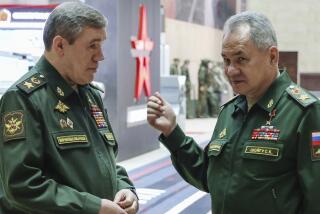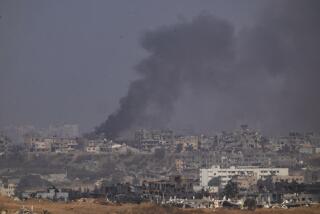U.S. Is Accused of Playing Role in Chalabi Case
- Share via
BAGHDAD — A top supporter of embattled former Iraqi exile leader Ahmad Chalabi accused the United States on Monday of backing bogus counterfeiting charges against the onetime American ally in order to neutralize Chalabi politically and install an “impotent” government.
Mithal Alusi, a member of Chalabi’s Iraqi National Congress party, said arrest warrants issued by an Iraqi court over the weekend were part of an international plot that is “bigger than anyone could imagine” to strip Chalabi of his popularity.
The charges come a week before a conference of Iraqi civic and tribal leaders that will appoint an interim national assembly. Chalabi, who was shut out of the interim government that took power in June, was expected to play a lead role at the gathering.
“The warrants were issued by a government that is lacking in will and authority,” Alusi said. “Every Iraqi government institution and facility is being run by so-called U.S. advisors who are under the control of the U.S. Embassy in Baghdad. The people behind this plot want an impotent Iraqi government, not capable of doing anything.”
Chalabi and his nephew, Salem Chalabi, were named in the arrest warrants issued by Zuhair Maliky, chief investigative judge of the Central Criminal Court of Iraq.
Salem Chalabi, who has been overseeing the effort to try deposed dictator Saddam Hussein on war crimes charges, was accused of murder in connection with threats made to a Finance Ministry official who was investigating Chalabi family real estate holdings. The official was later assassinated.
Both of the Chalabis issued new denials of the charges Monday, pledging to return to Iraq to fight them. Salem Chalabi was in London and Ahmad Chalabi was in Iran when the warrants were announced.
Ahmad Chalabi is accused of counterfeiting old Iraqi dinars. But Alusi said only about 3,000 counterfeit dinars, worth approximately $2, were found in Chalabi’s office, and they were marked as forgeries with a red stamp from the Iraqi Central Bank. Chalabi, who headed the Finance Committee of the now-defunct Iraqi Governing Council, has said he was engaged in an effort to stem counterfeiting. Alusi said Chalabi held the forged dinars as part of that effort.
A Central Bank official said his agency never sought the counterfeiting charges.
“The Central Bank has not lodged a complaint against any individual regarding money counterfeiting and never requested that such charges be brought,” Sinan Shabibi, the bank’s governor, told the French news agency Agence France-Presse.
As Chalabi’s supporters in Iraq insisted that the charges were politically motivated, U.S. officials in Washington sought to distance themselves from him in an estrangement that began this spring.
Chalabi worked closely with U.S. officials in the years before the Iraq war and was the top choice of the Bush administration for assuming leadership in a new Iraqi government.
But administration officials grew wary of him this year amid reports that he had contacts with Iran that may have included passing U.S. secrets. American officials also have been concerned that Chalabi has cultivated ties to militant Iraqi cleric Muqtada Sadr and his militia, who have been battling U.S. and Iraqi forces in renewed fighting since Thursday.
On Monday, the White House took a hands-off attitude to a onetime friend.
“His future will be decided by the people of Iraq, if he wants to continue to be involved in Iraq ‘s future,” White House Press Secretary Scott McClellan said. “This latest investigation, that is a matter for Iraqi authorities to handle.”
The State Department, never as close to Chalabi as the White House or Pentagon, also distanced itself. Adam Ereli, a State Department spokesman, said the charges “are certainly new to us. This is a question of the Iraqi justice system at work. And we are going to play the appropriate role, which is to let that process take its course.”
At the Pentagon, civilian officials have long supported Chalabi. As recently as May, Deputy Defense Secretary Paul D. Wolfowitz defended him, saying that intelligence he had provided saved American lives and helped troops. But a Wolfowitz spokesman did not return a call seeking comment.
Meanwhile, Democratic presidential candidate Sen. John F. Kerry pressed for more information about Chalabi and his activities.
“Serious questions about Ahmad Chalabi remain, including his role in providing misleading information about Iraqi weapons and his connections to Pentagon officials,” a Kerry spokesman said Monday. “We need a full and frank accounting of the administration’s relationship with Chalabi.”
Still, the warrants for the Chalabis brought a strong defense from some of their allies in Washington, and illustrated the divisions over him among the war’s supporters.
Richard N. Perle, a former top advisor to Secretary of Defense Donald H. Rumsfeld and a leader of the so-called neoconservatives who embraced Chalabi and the war, said in an interview that he believed the warrants were part of an effort against Chalabi undertaken by the Iraqi government with the support of the U.S. government.
“I’m sure it’s been encouraged by the U.S.,” Perle said in an interview from Europe.
He said CIA and State Department officials have long opposed Chalabi and have convinced others in the government to move against him. Now officials in the White House oppose Chalabi as well, Perle said.
“It was those reports that led to a decision to destroy him,” Perle said, adding that he believed there was no basis to the reports that Chalabi passed classified information to Iran.
Michael Rubin, a former advisor to the U.S.-led occupation authority in Iraq now at the American Enterprise Institute think tank, said the judge who issued the warrant was unqualified, and that the Bush administration and government of interim Iraqi Prime Minister Iyad Allawi wanted to keep Chalabi from gaining influence.
Rubin said the Allawi government had moved against Chalabi to prevent him from gaining a role in the upcoming conference. Maliky, the investigative judge, told The Times on Monday that politics had played no part in the issuance of the warrants.
Times staff writers T. Christian Miller and Edwin Chen in Washington and Janet Stobart in London contributed to this report.
More to Read
Sign up for Essential California
The most important California stories and recommendations in your inbox every morning.
You may occasionally receive promotional content from the Los Angeles Times.















